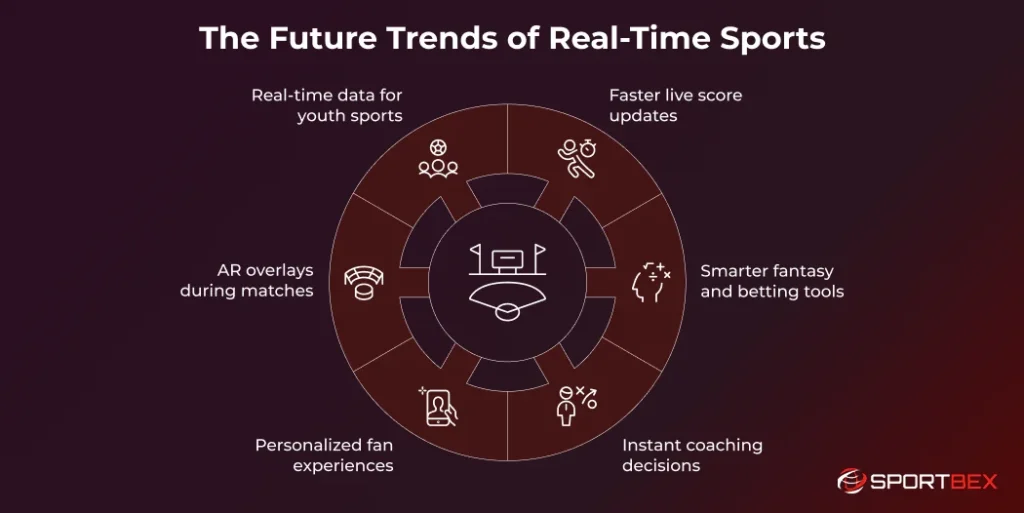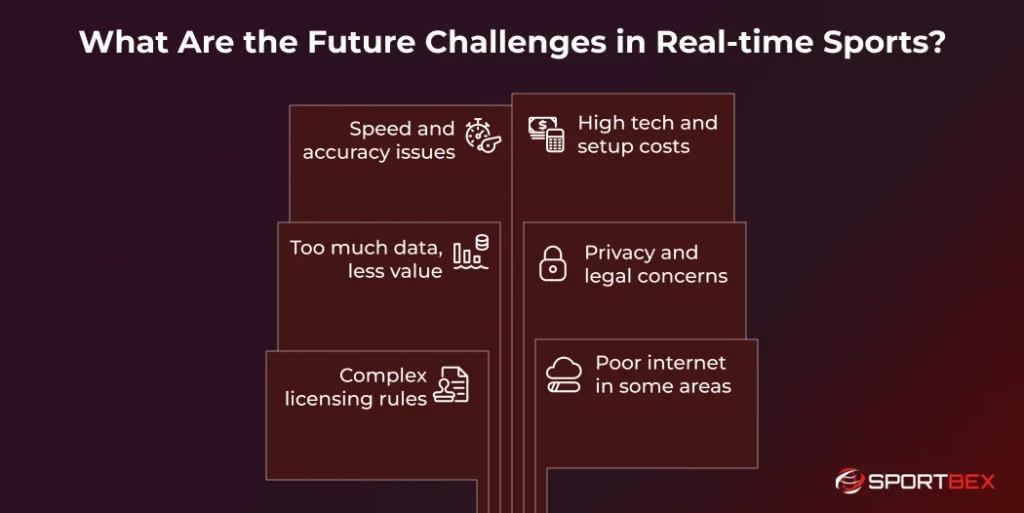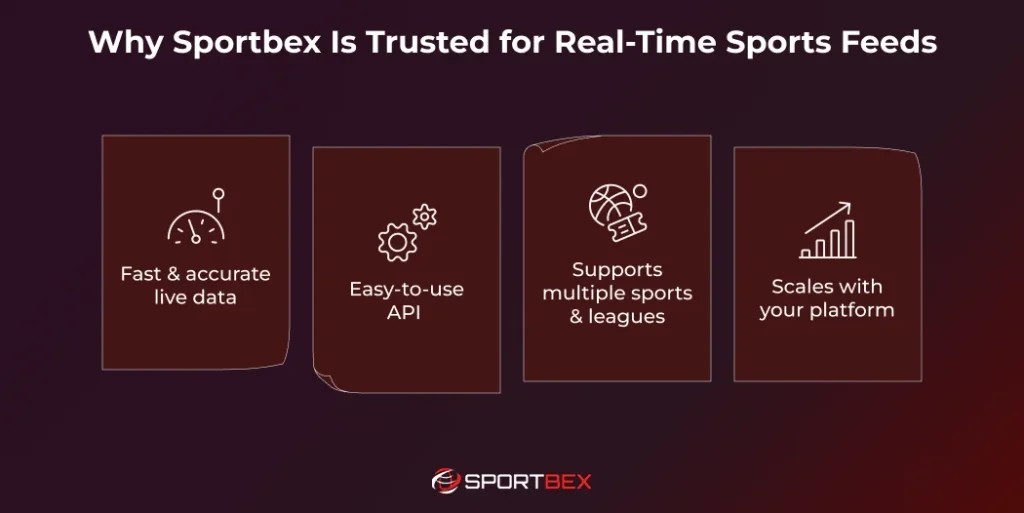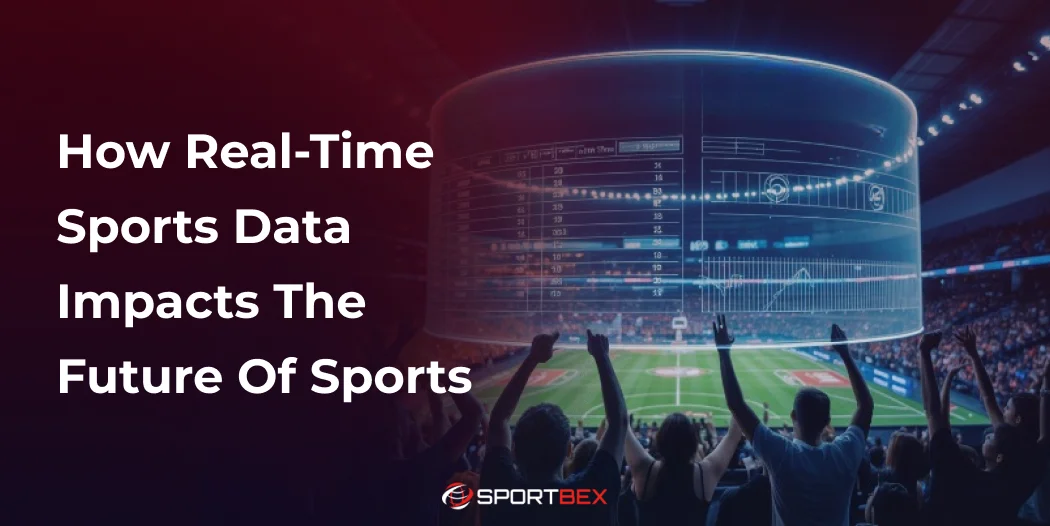The sports world is changing fast! Real-time data is changing how we watch and play our favorite games. From live score updates to AI helping coaches make decisions, technology is shaping the future of sports.
This guide shows how real-time sports data is changing the game, improving fan experiences, and boosting athlete performance. Learn about the tech, challenges, and why choosing the right sports data API provider matters for any platform.
Whether you’re a sports tech fan, an app developer, or just curious about the future of sports, this guide is for you. Explore a world where every play is captured instantly! Learn how real-time sports data impacts the future of sports and changes how we enjoy our favorite games.
What Is Real-Time Sports Data?
Real-time sports data involves instantly collecting and sharing information during games, from scores and stats to player movements, heart rates, and crowd noise, using advanced sensors and tracking.
The key advantage of real-time sports data is speed. Unlike older methods where stats were available hours or days later, real-time data is sent directly from stadiums to apps, websites, and platforms in milliseconds. This allows fans, coaches, and analysts to get live updates instantly.
Sports Data APIs make this possible by processing the raw data, ensuring it’s clean, accurate, and ready to use. These systems are the link between the data collected in stadiums and the millions of sports applications used worldwide.
This comprehensive approach provides a full view of games and opens up exciting new possibilities for sports experiences and analysis.
The Future Trends of Real-Time Sports

The sports industry trends are changing fast with new real-time data technology. These advancements are set to change how we watch, understand, and play sports at all levels.
Faster live score updates
The demand for instant sports updates is growing fast, and soon a Sports Results API will deliver updates almost instantly, with delays so small they’ll feel like real-time.
Machine learning is also helping by predicting what updates might happen next, so the system can prepare the information before the event even occurs. This makes live sports apps feel quicker and more responsive.
Smarter fantasy and betting tools
Real-time data is transforming API fantasy sports and betting by providing fans with better insights into player performance and game dynamics. Future platforms will use this data for features like dynamic pricing, strategy tips, and automated decision-making tools.
Betting platforms will also improve, using real-time factors like weather, player fatigue, and coaching decisions to adjust odds instantly, making betting more engaging and fair, especially with the support of a reliable Betting Odds API that delivers fast, accurate updates.
Instant coaching decisions
Professional sports teams are using real-time analytics to help coaches make better decisions during games. Future systems will combine data from multiple sources to give real-time tips, player alerts, and tactical advice.
AI-powered video analysis tracks opponent patterns and weaknesses in real time, providing on-screen suggestions for quick decisions. Machine learning uses past game data to recommend player rotations, timeouts, and strategies, keeping teams competitive.
Personalized fan experiences
The future of sports viewing is all about personalization. Real-time data will tailor experiences to each fan’s preferences and interests. Apps will learn what fans enjoy and show relevant content automatically.
Social features will let fans connect with others who share their interests or support the same team. They’ll be able to chat, make predictions, and celebrate together during live games.
AR overlays during matches
Augmented reality (AR) is set to transform how we experience sports by adding real-time information to live games. Imagine watching a game and seeing player names, stats, and performance details pop up on your screen instantly.
Advanced technology will track players, the ball, and equipment, displaying details as overlays on any device. AR tools will show strategies like play diagrams and player positions, helping fans follow the action.
Real-time data for youth sports
Understanding the difference between Static Data vs Live Data is crucial. While static data provides historical insights and trends, live data offers real-time performance updates, enabling instant decisions and adjustments during training or matches.
Affordable sensors and smartphone tracking will help youth teams monitor performance, identify talent, and improve training. Safety tools will track real-time health data to warn about tiredness or dehydration and prevent injuries.
What Are the Future Challenges in Real-time Sports?

Real-time sports data systems are exciting, but they come with challenges. Understanding these is key for anyone developing or using sports tech.
Speed and accuracy issues
The biggest challenge with real-time sports data is balancing speed and accuracy. Faster updates, like sub-second speeds, leave less time to correct errors, making reliability harder to maintain.
Finding mistakes in data is tough in fast-moving systems. Traditional methods can slow down real-time updates, so we need faster, more accurate solutions.
High tech and setup costs
Setting up real-time sports data systems can be costly, especially for smaller organizations. These systems require sensors, fast networks, and analytics platforms, which are expensive to install and maintain.
Technology in this field changes fast. Expensive systems quickly become outdated, requiring constant upgrades to stay competitive, making long-term costs unpredictable.
Too much data, less value
The huge amount of sports data available today, including live sports data feeds, can be overwhelming, making it harder to find value instead of easier. Managing this data requires smart tools to highlight the important information.
Too much data can overwhelm systems and users. For a sports data provider, managing and streamlining data is essential to ensure efficiency and user satisfaction.
Privacy and legal concerns
Collecting detailed performance data, like biometric information from athletes, brings up important privacy and legal issues that need careful attention as real-time systems become more common.
Professional athletes may have contracts protecting their data, but amateur and youth athletes often don’t have the same safeguards for their personal information.
Complex licensing rules
Sports data licensing is complicated due to the many stakeholders with varying goals. Here’s why it gets tricky:
- Leagues and venues control real-time data, limiting access and stifling competition in sports tech.
- Cross-border or multi-league data licensing causes delays for new products.
- Revenue sharing disputes between collectors, distributors, and rights holders create uncertainty and affect pricing.
These challenges make it harder and more expensive to develop sports data services.
Poor internet in some areas
Infrastructure challenges in many areas make it hard to provide high-quality real-time sports data. This creates unequal access to advanced sports technology and limits market growth.
Poor internet connectivity means many people can’t access real-time sports data. This digital gap affects both fans and athletes, reducing their opportunities.
Why Sportbex Is Trusted for Real-Time Sports Feeds

Sportbex provides real-time sports data, offering reliable, high-performing solutions that address key challenges in sports technology.
Fast & accurate live data
Sportbex ensures speed and accuracy with advanced systems that validate data instantly. Their multi-layered checks keep data reliable while delivering updates in under a second, making it the perfect foundation for building a Live Score App that offers real-time, accurate updates to users.
Backup systems store copies of important data to keep things running smoothly if issues arise and ensure data accuracy.
Easy-to-use API
Sportbex’s API Sports Data platform is user-friendly and feature-packed, simplifying integration for developers with all the tools they need.
Flexible authentication lets clients pick their security setup, while adjustable rate limits suit any budget. Clear error messages help developers fix issues quickly and keep systems running.
Supports multiple sports & leagues
From pro leagues to international competitions and emerging markets, Sportbex covers it all, helping clients build full sports platforms without multiple vendors.
Sportbex constantly adds new leagues and competitions, helping clients grow their platforms without switching providers. They cover both popular and niche sports with dedicated audiences.
Scales with your platform
The system works seamlessly at any activity level, ensuring smooth performance during both slow and busy times. Clients never need to worry about high traffic; it’s always ready.
Flexible pricing matches your actual usage, so startups can start affordably, and larger businesses can scale predictably without breaking the bank.
Get a Ready-Made Platform On Rent.
Get Started TodayConclusion
Real-time sports data is changing the way we watch, play, and connect with sports. This guide highlights how new trends are shaping the future of sports entertainment and athletic performance.
These changes are here. Pro teams use real-time biometrics to boost performance, while youth programs use affordable tracking for safety. Innovations like these, combined with tools such as a Sport Odds API, are transforming sports at every level and raising the standard for modern sports data services.
Companies like Sportbex are key players in this transformation. They don’t just provide reliable sports data; they help drive innovation and give everyone access to these advancements, not just big-budget teams.
Real-time sports data is the foundation of this future, connecting the digital and physical worlds in ways we’re just beginning to imagine. The game is changing, and the best is yet to come!
Frequently Asked Questions
It powers live apps, betting platforms, fantasy sports, broadcasts, and helps coaches make faster decisions during games.
Broadcasters, app developers, fantasy platforms, coaches, analysts, betting companies, and fans all use it.
Sportbex offers fast, reliable, and developer-friendly data feeds for 200+ leagues across multiple sports.
No, it’s also used by startups, fantasy sports players, bloggers, and independent developers building sports platforms.
Real-time data is updated live during the match, while post-match data is published after the game ends.
Recent Blog
Tracking Tennis Odds Live Using Real-Time Betting APIs
February 26, 2026
What Is Horse Race Live Streaming? Complete Guide
February 25, 2026



